Too often when you reach the top of anything, a mountain or a career, you find yourself standing alone or with very few others. Attrition travels the length of the ascent. It may be that only the highly skilled and the very wounded make it to the top. The highly skilled arrive because they’re more prepared for success than anyone else in the world. The skilled-but-deeply-wounded arrive not because they’re so majestically prepared for success but because they cannot stop moving. Even the peak does not stop them. Space is their next frontier. Final frontier? Hardly.
 For me, my recent visit to Laity Lodge was about opening my eyes to see that we are little children and everything we have is a gift. It was about opening my eyes to see that our heavenly Father is there. To see Him all around us — to see Him in places we may not have seen Him before — to see His love in everything that we have been given, in all the works of His hands.
For me, my recent visit to Laity Lodge was about opening my eyes to see that we are little children and everything we have is a gift. It was about opening my eyes to see that our heavenly Father is there. To see Him all around us — to see Him in places we may not have seen Him before — to see His love in everything that we have been given, in all the works of His hands.Don’t Leave Your Brains at the Box Office
For its two-plus hours, it is wonderfully done: beautifully imagined, well acted, tenderly told, and when it was all over I was pleased. There is no way that the complexity and nuance of the novel could be captured in a film. So the director and the screenwriter are making choices, for good or not, about how to the tell the story in a way that is fair, but is at the same time their own work of art, too. I get that, and I honor that.
But there was a false note.
 I study the stuff of my inheritance accidentally in every mirror and in every setting of the table, but I call them heirlooms because I inherit them from women I know and love. I cannot help but bear the silver hair of my grandmother, and by some indiscernible mix of nature and nurture, I love the game of bridge. Most likely, even in an open adoption, my non-biological children will not so easily see themselves growing into the people whose genetics made them. Spliced into us, they will stand to inherit much more — both the biological nature of their first family and the adopted nurture of their forever family — but through a sharp loss.
I study the stuff of my inheritance accidentally in every mirror and in every setting of the table, but I call them heirlooms because I inherit them from women I know and love. I cannot help but bear the silver hair of my grandmother, and by some indiscernible mix of nature and nurture, I love the game of bridge. Most likely, even in an open adoption, my non-biological children will not so easily see themselves growing into the people whose genetics made them. Spliced into us, they will stand to inherit much more — both the biological nature of their first family and the adopted nurture of their forever family — but through a sharp loss.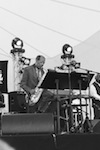 I want to tell you about my reality, about how boring and splintered it can be, how chaotic and bland, how unexpected and structured it is. In other words, I want to tell you about the ordinariness of my life and how that ordinariness doesn’t feel as beautiful as Wendell Berry makes it out to be.
I want to tell you about my reality, about how boring and splintered it can be, how chaotic and bland, how unexpected and structured it is. In other words, I want to tell you about the ordinariness of my life and how that ordinariness doesn’t feel as beautiful as Wendell Berry makes it out to be. That moment threw a quiet mantle of wonder over the rest of the season, tinging every act with a significance I had never known. A few days before Christmas I was up on a ladder wiring greenery onto a chandelier in anticipation of the loved ones that were soon coming, humming “Lo, How a Rose” under my breath (anything that had anything to do with roses seemed inherent with meaning that year), when suddenly I stepped down, clippers in hand, under the thrall of a singularly beautiful thought. I went straight to the phone, dialed the wholesale florist I use, and promptly ordered a huge box of blood-red roses.
That moment threw a quiet mantle of wonder over the rest of the season, tinging every act with a significance I had never known. A few days before Christmas I was up on a ladder wiring greenery onto a chandelier in anticipation of the loved ones that were soon coming, humming “Lo, How a Rose” under my breath (anything that had anything to do with roses seemed inherent with meaning that year), when suddenly I stepped down, clippers in hand, under the thrall of a singularly beautiful thought. I went straight to the phone, dialed the wholesale florist I use, and promptly ordered a huge box of blood-red roses.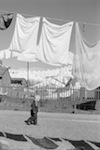 Sorting the clothes on the floor of our bedroom, piling them into the hamper, measuring out the detergent and tossing the pieces one by one into our washing machine: this is how I know I’m home. The jerks and thumps of the washing machine, the pause just before the spin cycle, even the obnoxious beep of the dryer: these noises sound like home to me. Doing laundry means I am back in the place where my soul rests, the place where I can marshal my forces, and also lie down and sleep in peace.
Sorting the clothes on the floor of our bedroom, piling them into the hamper, measuring out the detergent and tossing the pieces one by one into our washing machine: this is how I know I’m home. The jerks and thumps of the washing machine, the pause just before the spin cycle, even the obnoxious beep of the dryer: these noises sound like home to me. Doing laundry means I am back in the place where my soul rests, the place where I can marshal my forces, and also lie down and sleep in peace. In one weekend, we virtually erased it all. We peeled back all of the layers and tossed them away to start fresh. It was the right thing to do, but I couldn’t help feeling a little sad. For every renovation and remodel we do to this house, we erase some of its story. This house has been through a lot — more than even the previous owner knows — and when we change it, we take something away.
In one weekend, we virtually erased it all. We peeled back all of the layers and tossed them away to start fresh. It was the right thing to do, but I couldn’t help feeling a little sad. For every renovation and remodel we do to this house, we erase some of its story. This house has been through a lot — more than even the previous owner knows — and when we change it, we take something away. Like so many of life’s other challenges — the marathon worth running, the job worth doing well, the piano sonata worth mastering — motherhood has taught me, as nothing else has, about process. The work of raising young children is no less essential or foundational than the tasks my younger, childless self wanted to rush through. I can’t neglect my children’s play time or resent their basic needs and still expect to have great relationships and conversations with them when they’re older, any more than I could have skipped writing the beginning of this essay and had the end come out the right way.
Like so many of life’s other challenges — the marathon worth running, the job worth doing well, the piano sonata worth mastering — motherhood has taught me, as nothing else has, about process. The work of raising young children is no less essential or foundational than the tasks my younger, childless self wanted to rush through. I can’t neglect my children’s play time or resent their basic needs and still expect to have great relationships and conversations with them when they’re older, any more than I could have skipped writing the beginning of this essay and had the end come out the right way. I am a token here, an altar to mark the space where a dream was dreamed, a forest cleared, land reclaimed, a foundation laid, a hope hoped, a desire met. I sit upright on two front columns, regal, and alert, a king keeping watch over kingdom. My sides show their age, remorselessly and violently pierced by windblown shrapnel, by swirling apathy. Layers of cream-colored paint chip and peel revealing ever older storied layers. Sinewy mortar deteriorates in the space between bricks, and my lit soul wavers between the colorful future and the black-and-white past. Though riddled with exhaustion, I remain.
I am a token here, an altar to mark the space where a dream was dreamed, a forest cleared, land reclaimed, a foundation laid, a hope hoped, a desire met. I sit upright on two front columns, regal, and alert, a king keeping watch over kingdom. My sides show their age, remorselessly and violently pierced by windblown shrapnel, by swirling apathy. Layers of cream-colored paint chip and peel revealing ever older storied layers. Sinewy mortar deteriorates in the space between bricks, and my lit soul wavers between the colorful future and the black-and-white past. Though riddled with exhaustion, I remain.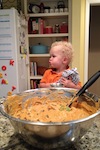 I thought I knew the importance of sharing food. I have taken food to new moms and seen my mom’s counter overflowing with casseroles after my dad died. I have experienced the common grace of bread and wine. But it wasn’t until my husband put a plate in front of my exhausted body every night that I truly understood how much he loved me. He nourished me until I was ready to survive. The closest I can come to describing it is that it felt like being protected in a womb just like I had protected my son for all those months.
I thought I knew the importance of sharing food. I have taken food to new moms and seen my mom’s counter overflowing with casseroles after my dad died. I have experienced the common grace of bread and wine. But it wasn’t until my husband put a plate in front of my exhausted body every night that I truly understood how much he loved me. He nourished me until I was ready to survive. The closest I can come to describing it is that it felt like being protected in a womb just like I had protected my son for all those months.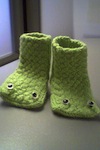 It was a revelation: With my own hands and a little patience, I could make some of the very things I’d been planning to buy — and with just as fine or a finer result. Later on would come the challenge of translating what I saw in my mind’s eye into something that could keep my neck and hands warm. For now I reveled in the discovery of this power to create.
It was a revelation: With my own hands and a little patience, I could make some of the very things I’d been planning to buy — and with just as fine or a finer result. Later on would come the challenge of translating what I saw in my mind’s eye into something that could keep my neck and hands warm. For now I reveled in the discovery of this power to create.An Iconography of Birds
That birds, with their riot of color and sound and an ability to fly, have come to be associated with the stories of our deeply human quest to explore such things only makes sense. They are our fellow creatures — dust to dust, ashes to ashes — yet manage to break free of the shackles of gravity and transcend the ground from which we are all made.
 I realized I wasn’t teaching these tiny people how to use their imaginations or how to be creative because they already were practically brimming over with innate curiosity. They were being who they were born to be — curious people. And if they were born like that, then surely I was, too. Over the years of working with children I learned to learn from them, and in the process, I have learned about myself.
I realized I wasn’t teaching these tiny people how to use their imaginations or how to be creative because they already were practically brimming over with innate curiosity. They were being who they were born to be — curious people. And if they were born like that, then surely I was, too. Over the years of working with children I learned to learn from them, and in the process, I have learned about myself. It was not long after we landed that I became keenly aware of my own needs, which seemed myriad and great, physical and emotional and practical. As my pregnancy progressed, my body ached and grew weary very quickly, yet my responsibilities for my son and our household in this new place required a lot of physical activity. I was coming from a place where my sanity, and that of our son, was maintained by interacting with other families with small children on a daily basis, but in Iceland I knew no one.
It was not long after we landed that I became keenly aware of my own needs, which seemed myriad and great, physical and emotional and practical. As my pregnancy progressed, my body ached and grew weary very quickly, yet my responsibilities for my son and our household in this new place required a lot of physical activity. I was coming from a place where my sanity, and that of our son, was maintained by interacting with other families with small children on a daily basis, but in Iceland I knew no one. I did want to tell my story kindly. I love my family. It delights me that that is how it has come across. I see no benefit for myself or others if I tell a story filled with anger and bitterness. Frankly, I think if I am unable to extend mercy to the people in my story, and receive the gifts they have given, even ones that have caused suffering, then I should wait until I am able to process, to heal more deeply.
I did want to tell my story kindly. I love my family. It delights me that that is how it has come across. I see no benefit for myself or others if I tell a story filled with anger and bitterness. Frankly, I think if I am unable to extend mercy to the people in my story, and receive the gifts they have given, even ones that have caused suffering, then I should wait until I am able to process, to heal more deeply.The Work of Love
As my journals filled with the details of my life — raising children to adulthood, becoming a writer, years of hosting people and events, the development of Art House America, pursuing a seminary degree, and becoming a grandmother — the words on the page gave me eyes to see the significance of the smaller things that are always present.
Sure, there are high points, nameable moments of climax — but most of my daily life still takes place in the in-between.
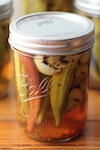 I wanted to do it alone. I lit the candles in the kitchen and turned on some music. Today, this would be the way I talked to God, and what I wanted to talk about was my grandmothers, and the way I wanted to talk about them was by doing something with my hands that their hands had done time and again.
I wanted to do it alone. I lit the candles in the kitchen and turned on some music. Today, this would be the way I talked to God, and what I wanted to talk about was my grandmothers, and the way I wanted to talk about them was by doing something with my hands that their hands had done time and again. In contrast, the pieces of my life didn't feel safe or ordered at all, but wedged inside a room too small to contain them. My emotions were beginning to seep uncontrolled from that room faster than I could shove them back in. Desperately, I wanted to dig myself free from this avalanche of events that had happened, all so abruptly and without my permission.
In contrast, the pieces of my life didn't feel safe or ordered at all, but wedged inside a room too small to contain them. My emotions were beginning to seep uncontrolled from that room faster than I could shove them back in. Desperately, I wanted to dig myself free from this avalanche of events that had happened, all so abruptly and without my permission. The Arctic coastal plains are flat, stretching from the mountains to the sea. The lines shimmer with beauty. The social view of beauty thinks something is missing in this flatness. In between is nothing. But in between is the space where imaginations live and souls dance. There’s so much more to see than flat. The flat distance offers the middle view. The middle view that’s missing is something that takes effort to see.
The Arctic coastal plains are flat, stretching from the mountains to the sea. The lines shimmer with beauty. The social view of beauty thinks something is missing in this flatness. In between is nothing. But in between is the space where imaginations live and souls dance. There’s so much more to see than flat. The flat distance offers the middle view. The middle view that’s missing is something that takes effort to see.

















